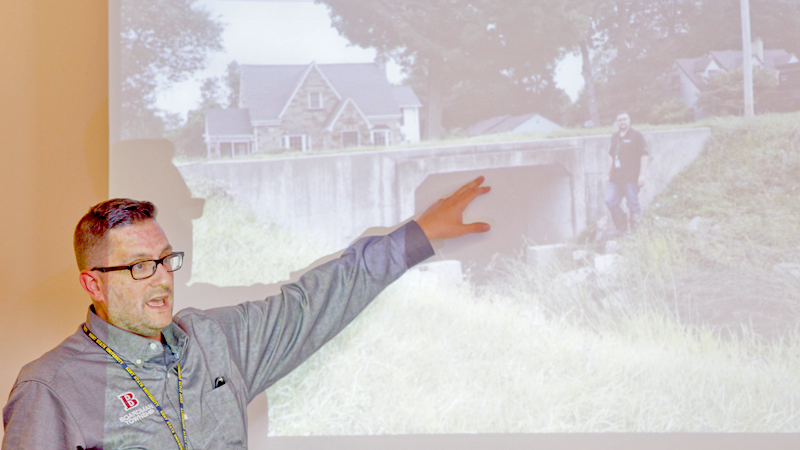ABC water district plans to levy fee on home, business owners

By: Jessica Hardin
jhardin@vindy.com
BOARDMAN
ABC Water and Storm Water District aims to dissipate the clouds that have collected over Boardman’s storm water infrastructure. Representatives from the district, which intends to be operational by April, presented their progress in a meeting at Boardman Township Administration building Wednesday evening.
The strategic partnership of Austintown, Boardman and Canfield townships is the result of frustrations over a lack of storm services and potable water. It is independent of these townships and as a political entity, can borrow money and issue bonds and notes.
But ABC is less restricted than the township.
“Townships have this pool of money they can go after, and outside of that, it is very difficult to find grant money for the township to do storm water infrastructure projects,” explained Township Administrator Jason Loree.
ABC, however, plans to levy a utility fee on residents and business owners, based on the amount of non-pervasive surface on their property.
Mark Delisio, ABC’s engineer, explained that the district has more power than a home rule township. It has the legal authority to acquire property and is less limited in terms of funding sources.
The district also has the advantage of a single issue area.
“There is a hyper focus on this problem. This is our only goal,” Loree said.
ABC has already begun mapping the area, and when the district is operational, it will begin identifying storm water projects in each community.
A significant amount of Monday’s meeting was spent explaining the complex nature of the flooding problems inundating Boardman.
Much of Boardman’s retail development was built before regulations required developers to include storm water measures. Lax regulations also resulted in the building of structures on the floodplain, an area of low-lying ground adjacent to a river and subject to flooding.
Most older homes in the area also lack proper storm water drainage.
Loree and Delisio explained that residents experience sanitary backup in their basements due to now-illegal connections between sanitary systems and storm water drains.
“Homes were built when it was okay to tie the downspout to sanitary lines,” Loree said. When it rains heavily, rain water infiltrated residents’ sanitary lines, which are not very large, causing sanitary backup.
The increased frequency of massive storms exacerbates the issue.
“What we’re seeing now is climate change. The weather events are becoming more frequent and more violent,” Loree said.
Current regulations require that developers be able to hold rain from the 100-year storm, not the 1,000-year storm.
But as community members at the meeting made clear, Boardman residents’ issues are immediate and severe, irrespective of the system’s complexity.
Resident Barb Davis described water pouring through the electric sockets in her home.
“I was wishing I had an ark,” she told the officials.
Until ABC begins spearheading needed storm water projects, Loree urged concerned community members to ensure that their homes have legal sewage connections and to check that valves and sump pumps function correctly.
For those interested in getting involved with the district, Loree told residents to stay tuned for the creation of the ABC Board’s subcommittees.
 43
43
